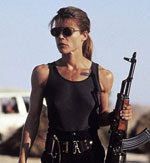 Earlier today I got on the phone with Black Dahlia screenwriter Josh Friedman*, and one of the topics of conversation ended up being The Sarah Connor Chronicles, the newly greenlit Terminator TV show he is executive producing and writing.
Earlier today I got on the phone with Black Dahlia screenwriter Josh Friedman*, and one of the topics of conversation ended up being The Sarah Connor Chronicles, the newly greenlit Terminator TV show he is executive producing and writing.
The Sarah Connor Chronicles takes place between Terminator 2 and Terminator 3, which has left fans wondering what the heck is this show going to be about anyway? Is it just going to be Sarah and John Connor as mom and son, sort of an Alice with rocket launchers instead of Mel’s Diner? Will there be any Terminators in the show? Friedman was as cryptic as possible, but did let loose some tantalizing hints.
“I would like to be able to explore as many different avenues of Terminator mythology as possible,” he told me. “I think to do a show that is a completely Terminator-less environment would probably not be, in the long run, a wise move or the most interesting thing.”
Ever since the success of 24 and Lost serialized dramas have been the networks’ latest fascination. Friedman says that while he likes long story arcs, he’s not bringing the show in that direction. “I always go back to The X-Files, which I think did a good job of balancing close-ended stories with mythology stories,” Friedman said. “The show will certainly not be a close-ended, procedural adventure of the week show. I would say it’s going to be a hybrid. It’ll be somewhere in between – it’s not going to be a Terminator of the week show, but it’s also not going to be soap opera.”
And Friedman knows you’re paying attention to this show, and he has only one thing to ask of you. "I read the talk backs, and people are pissed. They don’t want you to mess with it. The internet has a love/hate thing with the properties they love – they want more and they want it done well, but they hate it if Cameron’s not involved. All I ask is that people withhold judgment until they see it. I think it’s pretty fucking cool."
* I’m not allowed to review The Black Dahlia until next week (I already begged to go early, but no dice), but I’ll tell you now that it’s a very good film. De Palma is at the top of his game here, bringing us a noir thriller that’s so of the era in which it’s set – the late 40s – that it feels like it should be in black and white. And Friedman’s script, which does a fantastic job of keeping the spirit and grit of James Ellroy’s novel while maintaining a tight pace, may very well end up getting the nomination for Best Adapted Screenplay.